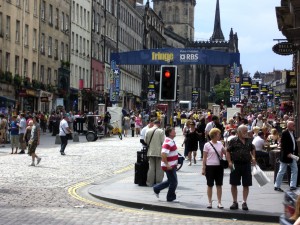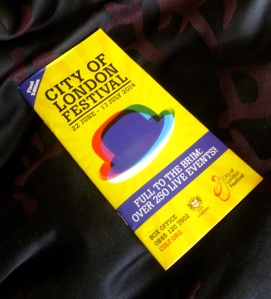The Edinburgh Fringe Programme is published in two days time.
Paul Gudgin, former boss of the Edinburgh Fringe, got in touch with me last week to publicise the City of London Festival, which he now runs.
But, when we met yesterday, inevitably, the subject of the Edinburgh Fringe’s increasingly prestigious Malcolm Hardee Comedy Awards came up.
“There aren’t many other comedians,” suggested Paul, “for whom the idea of setting up an award in their honour would gain traction.
“I once made a proposal to a couple of people who were interested in doing a book about the 10 or 20 people who ‘made the Edinburgh Fringe’. Obviously, people like Ricky DeMarco, Nica Burns, Bill Burdett-Coutts, Christopher Richardson but then I thought, actually, Malcolm Hardee too. There are certain key individuals who left an indelible mark on Edinburgh.”
“More like a few suspicious stains in Malcolm’s case,” I suggested.
“But on the comedy side of the Fringe,” said Paul, “he was one of the significant characters. It was that period from the early 1980s when comedy took hold and took off at the Fringe. At that time, a lot of the theatre was quite political and had a purpose and then you had someone like Malcolm Hardee fooling around, but there was some substance behind that too.”
“What was the substance?” I asked.
“I think whatever was on sale,” said Paul.
“He did epitomise the spirit of the Fringe,” I agreed, “in the sense that the spirit of the Fringe is that it is intentionally not organised. You were Director of the Edinburgh Fringe for eight years (1999-2007).”
“Yes,” said Paul. “That job title – Director – was strange, because you direct very little. In a way, the art of running the Fringe is having a seam of competence running under the general nonsense.
“It is anarchic up to the point when people want to receive their cheques. Then everyone expects it to be throughly professional. The job, really, is just about enabling. You try to maintain an equilibrium between what the city wants and what the performers and venues want.
“A lot of my time was taken up with disputes and complications between venues and performers particularly as the venues became more sophisticated and more commercially challenging.”
“What does ‘commercially challenging’ mean?” I asked.
“It was getting harder and harder to run venues in Edinburgh,” explained Paul, “because the people who own the properties – the Council and the University and other property owners – wanted more and more money.
“There is a slight temptation to demonise the big venues, but they have two major pressures – they are being squeezed by their landlords and they have all built up quite considerable infrastructures which need to be paid for. Also they have no security of tenure.
“It is one of the challenges we have here in London as well. When you try to put on a festival in a place where real estate values are soaring, it is going to affect you.”
“The collateral damage,” I suggested, “is that, because Edinburgh performers see themselves as getting ripped-off by the big pay venues (not the free venues) the Fringe Office is seen as ripping them off too.”
“The Fringe Society,” said Paul, “is a much steadier ship, because it doesn’t have the level of risk which the venues do, but it’s by no means wealthy.”
Paul started his career at the Aldeburgh Festival in Suffolk – “It was both a concert hall and a festival,” he told me.
Then he ran the Bury St Edmunds Festival – “It was mainly the festival,” he says, “but I was involved in running a couple of civic venues as well.”
Then, 1995-1999, he ran The Queen’s Hall in Edinburgh which, every August, runs events as part of the official Edinburgh International Festival.
Then he became Director of the Edinburgh Fringe for eight years, then four years as an independent consultant and now – since last August – he is Director of the City of London Festival.
“Why did you leave the Edinburgh Fringe?” I asked.
“I wouldn’t say I got bored with it at all. If you’re bored of the Fringe, you’re bored of life. But I do genuinely believe that, with festivals, you have a shelf life. It’s all about energy and ideas and there comes a point where a new person should take over.”
“So why London now?” I asked.
“All the good festivals I’ve ever been to,” Paul explained, “are characterised by the fact that the city is pretty much the star of the show. That’s certainly the case with Edinburgh. There are now 90 Fringe festivals around the world. Adelaide is fantastic and Amsterdam is a really good little Fringe. But I’ve been to a few others – no names – where, even though you have those same principles and some good shows, somehow the place doesn’t work in the way Edinburgh does.
“The City of London is a really interesting place, because virtually no-one lives here but 350,000 people descend on it during the day and you have these amazing buildings and spaces. On the one hand it’s this massive world financial centre and, on the other, it has extraordinary history and heritage. So there are a lot of interesting contradictions and I thought that was an interesting starting place for a festival.”
“Surely,” I said, “the City of London’s image is that it is dull and filled with non-arty people who are not anarchic and anarchy not conventionality is a good thing for creativity.”
(Note to non-UK readers of this blog, The City of London is not the same as the city of London. The City of London is the one square mile original city of London which is administratively separate from the rest of London. Now read on, confused…)
“The City of London,” I said, “is a staid city full of staid people.”
“But,” argued Paul, “in a way, that description might have been used of Edinburgh about 40 or 50 years ago. Edinburgh was seen as being very formal and stuffy and Glasgow was the place where things happened. In some ways, the Edinburgh Festival helped change that narrative. And, if ever there’s a place in the UK that needs a bit of a different narrative at the moment, it’s the City of London.”
“So you want to make the City of London Festival less stuffy?” I asked.
“Broader, definitely,” said Paul. “When I was a young music student, I used to come for lessons at the Guildhall and, since then, there have been massive changes in the City. There is a night time economy now. When I used to come, you couldn’t get a drink or a restaurant past 7.00pm. It’s a much younger and more diverse place now than it was years ago and I think the Festival programme has to reflect that.
“My predecessor’s major passion was classical music, particularly contemporary classical music. And there was quite a bit of dance and they did some wonderful installations. But most of the programme was classical music.
“We have still retained that music because, if you have St Paul’s Cathedral and all these amazing churches and livery halls…”
“But now you also have a new comedy section,” I said.
“Yes,” said Paul. “the festival hasn’t particularly had comedy before. I think if you put someone like Andy Zaltzman inside a large inflatable bowler hat shaped venue, it may get a bit of attention.
“We have all these beautiful venues – churches, livery halls – but they’re firstly mostly very formal and secondly hidden away. Stationers’ Hall is stunning – absolutely stunning – but no-one knows it’s there. And, while it’s nice for people to discover venues, you also need people to know you are actually happening.”
The large inflatable bowler hat venue is a symbol of the re-energised 52-year old City of London Festival.
“Is your target comedy audience,” I asked, “the people who go to comedy clubs in the West End?”
“Well,” said Paul, “we do have to get the London comedy audience coming into the City, but what I really want is a sense that, when it’s festival time, groups of people who work together in offices in the City will say Let’s go and have a drink, have a bite to eat and take in some comedy at the festival – in the same way non-tourists do in Edinburgh, where it becomes a big part of the social calendar. I’d love to see people coming out of their offices, walking down to Paternoster Square and taking in a bit of comedy.”









… programme is published in two days STOP. the word ‘time’ is redundant!!!!!! see im keeping an eye or two on you!
Quite right. Oh Lord.